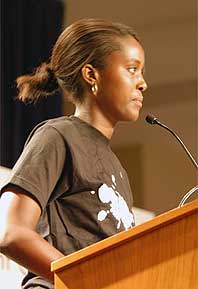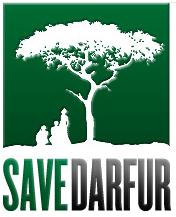
Omar Hassan Ahmad al-Bashir is a Sudanese former military officer and politician who served as Sudan's head of state under various titles from 1989 until 2019, when he was deposed in a coup d'état. He was subsequently incarcerated, tried and convicted on multiple corruption charges. He came to power in 1989 when, as a brigadier general in the Sudanese Army, he led a group of officers in a military coup that ousted the democratically elected government of prime minister Sadiq al-Mahdi after it began negotiations with rebels in the south; he subsequently replaced President Ahmed al-Mirghani as head of state. He was elected three times as president in elections that have been under scrutiny for electoral fraud. In 1992, al-Bashir founded the National Congress Party, which remained the dominant political party in the country until 2019. In March 2009, al-Bashir became the first sitting head of state to be indicted by the International Criminal Court (ICC), for allegedly directing a campaign of mass killing, rape, and pillage against civilians in Darfur. On 11 February 2020, the Government of Sudan announced that it had agreed to hand over al-Bashir to the ICC for trial.
Disinvestment refers to the use of a concerted economic boycott to pressure a government, industry, or company towards a change in policy, or in the case of governments, even regime change. The term was first used in the 1980s, most commonly in the United States, to refer to the use of a concerted economic boycott designed to pressure the government of South Africa into abolishing its apartheid regime. The term has also been applied to actions targeting Iran, Sudan, Northern Ireland, Myanmar, Israel, China and Russia.
The Janjaweed are an Arab nomad militia group operating in the Sahel region that operates in Sudan, particularly in Darfur and eastern Chad. They are also active in Yemen due to participating in the Saudi Arabian–led intervention in Yemen. According to the United Nations definition, Janjaweed membership consists of Arab nomad tribes from the Sahel, the core of whom are Abbala Arabs, traditionally employed in camel herding, with significant recruitment from the Baggara.
James F. Moore studies co-evolution in social and economic systems. He is best known for pioneering the Business ecosystem approach to studying networks of organizations that together constitute a system of mutual support and that co-evolve contributions. The business ecosystem is a form of organization distinct from and parallel to markets and firms. Moore argues that Business ecosystem is an essential unit of analysis for competition law, economics, sociology and management—a concept and unit of analysis that has been found necessary and helpful in business strategy and practice for many years.
The Darfur Peace and Accountability Act or DPAA restates the United States government's position that the Darfur conflict constitutes genocide, and asks the government to expand the African Union peacekeeping force in Darfur (AMIS) and give the force a stronger mandate, including more generous logistical support. It also directs the government to assist the International Criminal Court in bringing justice to those guilty of war crimes. It was passed by the House and Senate and signed into law by President Bush on 13 October 2006 along with a companion executive order.

The War in Darfur, also nicknamed the Land Cruiser War, was a major armed conflict in the Darfur region of Sudan that began in February 2003 when the Sudan Liberation Movement (SLM) and the Justice and Equality Movement (JEM) rebel groups began fighting against the government of Sudan, which they accused of oppressing Darfur's non-Arab population. The government responded to attacks by carrying out a campaign of ethnic cleansing against Darfur's non-Arabs. This resulted in the death of hundreds of thousands of civilians and the indictment of Sudan's president, Omar al-Bashir, for genocide, war crimes, and crimes against humanity by the International Criminal Court.

Stephanie Nyombayire is a Rwandan activist and public official. She is the director general of communication in Office of the President of Rwanda and a representative for the Genocide Intervention Network.

The Save Darfur Coalition was an advocacy group that attempted "to raise public awareness and mobilize a massive response to the atrocities in Sudan's western region of Darfur." Headquartered in Washington, D.C., it was a coalition of more than 190 religious, political, and human rights organizations organized to campaign for a response to the atrocities of the War in Darfur, which culminated in a humanitarian crisis. By 2013, reports indicated that the conflict had claimed approximately 300,000 lives and had displaced over 2.5 million people.

This is the bibliography and reference section for the Darfur conflict series. External links to reports, news articles and other sources of information may also be found below.

While there is a consensus in the international community that ethnic groups have been targeted in Darfur and that crimes against humanity have therefore occurred, there has been debate in some quarters about whether genocide has taken place there. In May 2006, the International Commission of Inquiry on Darfur organized by United Nations "concluded that the Government of the Sudan has not pursued a policy of genocide ... [though] international offences such as the crimes against humanity and war crimes that have been committed in Darfur may be more serious and heinous than genocide." Eric Reeves, a researcher and frequent commentator on Darfur, has questioned the methodology of the commission's report.

Throughout its history, Darfur has been the home to several cultures and kingdoms, such as the Daju and Tunjur kingdoms. The recorded history of Darfur begins in the seventeenth century, with the foundation of the Fur Sultanate by the Keira dynasty. The Sultanate of Darfur was initially destroyed in 1874 by the Khedivate of Egypt. In 1899, the government of Anglo-Egyptian Sudan recognized Ali Dinar as the Sultan of Darfur, in exchange for an annual tribute of 500 pound sterling. This lasted until Darfur was formally annexed in 1916. The region remained underdeveloped through the period of colonial rule and after independence in 1956. The majority of national resources were directed toward the riverine Arabs clustered along the Nile near Khartoum. This pattern of structural inequality and overly underdevelopment resulted in increasing restiveness among Darfuris. The influence of regional geopolitics and war by proxy, coupled with economic hardship and environmental degradation, from soon after independence led to sporadic armed resistance from the mid-1980s. The continued violence culminated in an armed resistance movement around 2003.
Olympic Dream for Darfur is an organization and campaign to pressure the Government of the People's Republic of China to intervene on the side of civilians in the Darfur conflict. It claims that the Chinese government has the requisite influence to pressure the Sudanese government to accept international police into its country, although China disputes this. The methods of the campaign are alternative torch relays and boycotts intended to disrupt the 2008 Summer Olympics.
Brian Steidle is a former Marine Corps captain, military and security operations expert, and author who had worked on publicizing the Darfur conflict in Sudan. Steidle wrote a book, The Devil Came on Horseback, about his experience, which was turned into a documentary film that premiered at Sundance in 2007.
Day for Darfur is an international advocacy campaign that works to bring together activists in cities around the globe in calling for action on the crisis in Darfur, western Sudan.

China–Sudan relations are the bilateral relations between the People's Republic of China and the Republic of Sudan. China is currently one of Sudan's largest trade partners, importing oil and exporting low cost manufactured items as well as armaments into the country. Both states enjoy a very robust and productive relationship in the fields of diplomacy, economic trade, and political strategy. They formally established diplomatic relations on February 4, 1959, when Sudan formally recognized the sovereignty of the People's Republic of China and have since become close global allies, supporting each other in times of internal crises and international controversy such as during the Second Sudanese Civil War, the Darfur Crisis, and the Xinjiang Conflict. China continues to provide massive support to Sudan by developing its oil resources and supplying millions of dollars in loans, aid, foreign direct investments, and humanitarian assistance. In return, Sudan has become a reliable political and economic ally in the international arena, allowing China to maintain a significant stake in its oil sector.
Adam Sterling was the executive director of the Sudan Divestment Task Force, a project of the Genocide Intervention Network, and a graduate of University of California, Los Angeles with degrees in Political Science and African American Studies.

Sudan–United Kingdom relations are foreign relations between Sudan and the United Kingdom. Sudan has an embassy in London whilst the United Kingdom has an embassy in Khartoum. Most of the recent relations between the two countries centre on the region of Darfur.

United Nations Security Council resolution 1556, adopted on 30 July 2004, after recalling resolutions 1502 (2003) and 1547 (2004) on the situation in Sudan, the council demanded that the Sudanese government disarm the Janjaweed militia and bring to justice those who had committed violations of human rights and international humanitarian law in Darfur.

The Darfur genocide was the systematic killing of ethnic Darfuri people during the War in Darfur. The genocide, which was carried out against the Fur, Masalit and Zaghawa ethnic groups, led the International Criminal Court (ICC) to indict several people for crimes against humanity, rape, forced transfer and torture. An estimated 200,000 people were killed between 2003 and 2005.Other sources estimate that between 2003 and 2008, the conflict resulted in about 300,000 civilian deaths and about 2.7 million displaced civilians.

Mohamed Hamdan Dagalo, generally referred to mononymously as Hemedti, is a Sudanese military officer and the current head of the paramilitary Rapid Support Forces (RSF). A Janjaweed leader from the Rizeigat tribe in Darfur, he was the Deputy head of the Transitional Military Council (TMC) following the 2019 Sudanese coup d'état. Since 2013, Hemetti has commanded the RSF. He was considered by The Economist to be the most powerful person in Sudan as of early July 2019.












